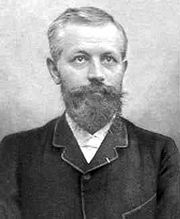
Unit-point atomism
Encyclopedia



Paul Tannery
Paul Tannery was a French mathematician and historian of mathematics. He was the older brother of mathematician Jules Tannery, to whose Notions Mathématiques he contributed an historical chapter...
(1887), Pour l'histoire de la science Hellène (Paris), and J. E. Raven
John Raven
John Earle Raven , who published as J. E. Raven, was an English classical scholar, notable for his work on presocratic philosophy, and amateur botanist.-Early life and education:...
(1948), Pythagoreans and Eleatics (Cambridge: Cambridge University Press), are the major purveyors of this view. unit-point atomism was the philosophy of the Pythagoreans, a conscious repudiation of Parmenides
Parmenides
Parmenides of Elea was an ancient Greek philosopher born in Elea, a Greek city on the southern coast of Italy. He was the founder of the Eleatic school of philosophy. The single known work of Parmenides is a poem, On Nature, which has survived only in fragmentary form. In this poem, Parmenides...
and the Eleatics
Eleatics
The Eleatics were a school of pre-Socratic philosophers at Elea , a Greek colony in Campania, Italy. The group was founded in the early fifth century BCE by Parmenides. Other members of the school included Zeno of Elea and Melissus of Samos...
. It stated that atoms were infinitesimally small ("point") yet possessed corporeality. It was a predecessor of Democritean
Democritus
Democritus was an Ancient Greek philosopher born in Abdera, Thrace, Greece. He was an influential pre-Socratic philosopher and pupil of Leucippus, who formulated an atomic theory for the cosmos....
atomism
Atomism
Atomism is a natural philosophy that developed in several ancient traditions. The atomists theorized that the natural world consists of two fundamental parts: indivisible atoms and empty void.According to Aristotle, atoms are indestructible and immutable and there are an infinite variety of shapes...
. Most recent students of presocratic philosophy, such as Kurt von Fritz, Walter Burkert
Walter Burkert
Walter Burkert is a German scholar of Greek mythology and cult.An emeritus professor of classics at the University of Zurich, Switzerland, he also has taught in the United Kingdom and the United States...
, Gregory Vlastos
Gregory Vlastos
Gregory Vlastos was a scholar of ancient philosophy, and author of several works on Plato and Socrates. He was also a Christian and has written on Christian faith as well.-Life and works:...
, Jonathan Barnes
Jonathan Barnes
Jonathan Barnes is a British philosopher, translator and historian of ancient philosophy.-Education and career:He was educated at the City of London School and Balliol College, Oxford University....
, and Daniel W. Graham have rejected that any form of atomism can be applied to the early Pythagoreans (before Ecphantus of Syracuse).Gregory Vlastos
Gregory Vlastos
Gregory Vlastos was a scholar of ancient philosophy, and author of several works on Plato and Socrates. He was also a Christian and has written on Christian faith as well.-Life and works:...
and Daniel W. Graham (1996), Studies in Greek Philosophy: The Presocratics (Princeton: Princeton University Press), 257.
Unit-point atomism was invoked in order to make sense of a statement ascribed to Zeno of Elea
Zeno of Elea
Zeno of Elea was a pre-Socratic Greek philosopher of southern Italy and a member of the Eleatic School founded by Parmenides. Aristotle called him the inventor of the dialectic. He is best known for his paradoxes, which Bertrand Russell has described as "immeasurably subtle and profound".- Life...
in Plato's
Plato
Plato , was a Classical Greek philosopher, mathematician, student of Socrates, writer of philosophical dialogues, and founder of the Academy in Athens, the first institution of higher learning in the Western world. Along with his mentor, Socrates, and his student, Aristotle, Plato helped to lay the...
Parmenides: "these writings of mine were meant to protect the arguments of Parmenides against those who make fun of him. . . My answer is addressed to the partisans of the many. . ."Jonathan Barnes
Jonathan Barnes
Jonathan Barnes is a British philosopher, translator and historian of ancient philosophy.-Education and career:He was educated at the City of London School and Balliol College, Oxford University....
(1982), The Presocratic Philosophers (London: Routledge), 232–33. The anti-Parmenidean pluralists were supposedly unit-point atomists whose philosophy was essentially a reaction against the Eleatics. This hypothesis, however, to explain Zeno's paradoxes
Zeno's paradoxes
Zeno's paradoxes are a set of problems generally thought to have been devised by Greek philosopher Zeno of Elea to support Parmenides's doctrine that "all is one" and that, contrary to the evidence of our senses, the belief in plurality and change is mistaken, and in particular that motion is...
, has been thoroughly discredited.

